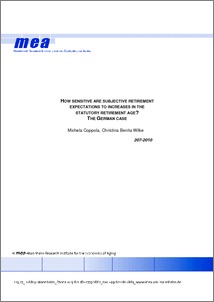|
How sensitive are subjective retirement expectations to increases in the statutory retirement age? The German case
Coppola, Michela
;
Wilke, Christina Benita
![[img]](https://madoc.bib.uni-mannheim.de/style/images/fileicons/application_pdf.png)  Vorschau |
|
PDF
211_207_10_komplett_geschuetzt.pdf
- Veröffentlichte Version
Download (659kB)
|
|
URL:
|
http://ub-madoc.bib.uni-mannheim.de/3009
|
|
URN:
|
urn:nbn:de:bsz:180-madoc-30092
|
|
Dokumenttyp:
|
Arbeitspapier
|
|
Erscheinungsjahr:
|
2010
|
|
Titel einer Zeitschrift oder einer Reihe:
|
None
|
|
Sprache der Veröffentlichung:
|
Englisch
|
|
Einrichtung:
|
Fakultät für Rechtswissenschaft und Volkswirtschaftslehre > Sonstige - Fakultät für Rechtswissenschaft und Volkswirtschaftslehre
|
|
MADOC-Schriftenreihe:
|
Veröffentlichungen des MEA (Mannheim Research Institute For the Economics of Aging) > MEA Discussion Papers
|
|
Fachgebiet:
|
300 Sozialwissenschaften, Soziologie, Anthropologie
|
|
Fachklassifikation:
|
JEL:
D03 D1 D84 H55 ,
|
|
Normierte Schlagwörter (SWD):
|
Deutschland , Rente , Rentenreform , Rentenalter
|
|
Abstract:
|
Population Aging poses an evident threat to the financial sustainability of pension systems based on a “pay-as-you-go” (PAYG) scheme. To cope with this threat, pension systems have undergone numerous reforms in many countries in order to keep people longer at work. One crucial element of these reforms typically is an increase in the statutory retirement age at which workers are legally allowed to retire. Two questions still remain unanswered: Will people really work longer? Who is more likely to retire before the new legal retirement age? In this paper, we focus on subjective retirement expectations, analysing if and to what extent they are affected by such a policy change. We consider the legislative reform introduced in Germany in 2007, which gradually will increase the statutory retirement age (SRA) from 65 to 67 years. Using the SAVE survey, a representative panel of German households, we estimate the increase of the individuals’ expected retirement age (ERA) as an effect of the reform. Our results show that less productive workers living in relatively wealthier households are more likely to plan an early retirement. The introduction of the reform seems to motivate better educated workers to remain longer in the labour force although it does not seem to completely succeed in keeping women longer in the labour force: especially among the younger cohorts, whose SRA will be 67 years, women are still more likely than men to plan an early retirement. In terms of the magnitude of the effect, we find that the reform shifted the expectations of the younger cohorts by almost two years – if these expectations will be realized, this reform would have been quite successful.
|
|
Zusätzliche Informationen:
|
|
 | Das Dokument wird vom Publikationsserver der Universitätsbibliothek Mannheim bereitgestellt. |
 Suche Autoren in Suche Autoren in
Sie haben einen Fehler gefunden? Teilen Sie uns Ihren Korrekturwunsch bitte hier mit: E-Mail
Actions (login required)
 |
Eintrag anzeigen |
|
|



 Suche Autoren in
Suche Autoren in